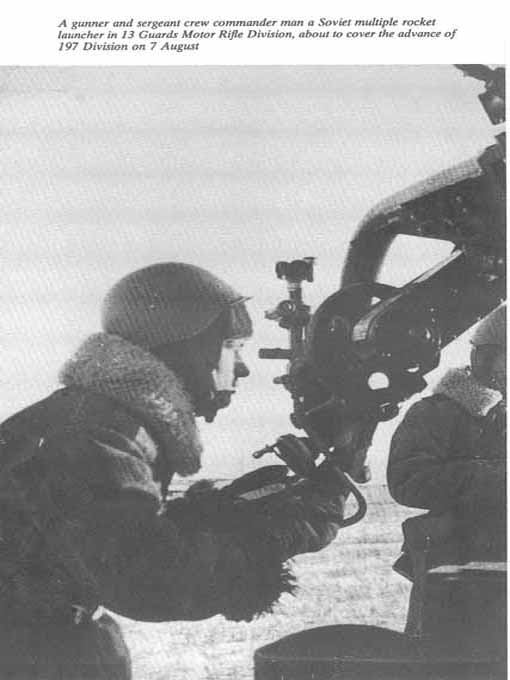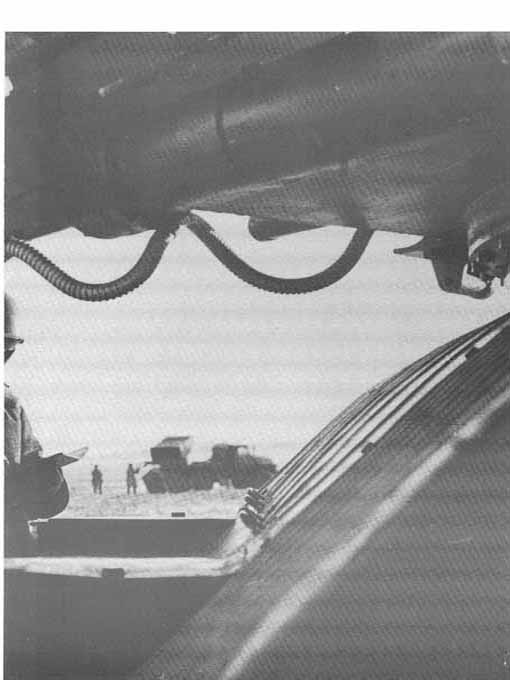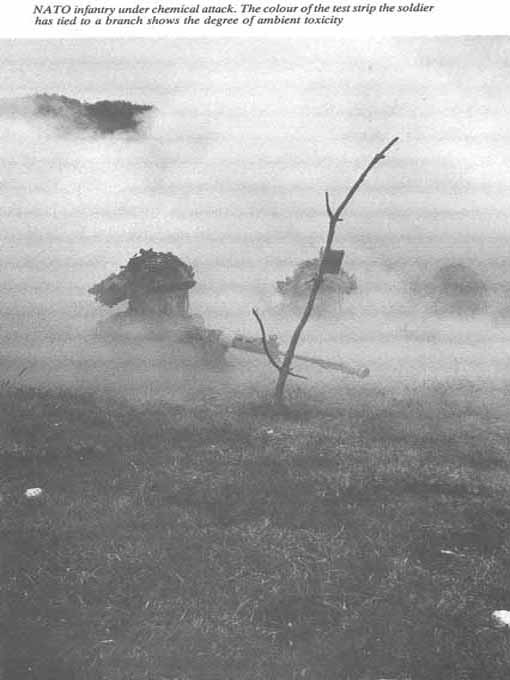The Third World War - The Untold Story (27 page)
Read The Third World War - The Untold Story Online
Authors: Sir John Hackett
Tags: #Alternative History

Soviet logistic planning was on the whole sound. It recognized that some unforeseen movement of divisions, or even armies, would be forced upon the High Command as the action developed, and made preparations accordingly. Notwithstanding the rigidity of much of Soviet planning, the movement of formations, as the flow of the battle dictated it, was carried out on the whole successfully in spite of Allied air interdiction, and the logistics proved generally adequate.
One formation directly affected by regrouping, as the pattern of the battle changed, was 197 Motor Rifle Division. It had come into the forward area as part of 28 Army, whose headquarters had been located in Belorussia in peacetime but whose main fighting strength and equipment was always held in the Group of Soviet Forces in Germany (GSFG). The outbreak of hostilities on 4 August found 28 Army to the south-east of 1 Guards Tank Army which had just moved forward westwards from near Dresden. On 5 August, 197 Division was transferred from 28 Army to come under command of 8 Guards Army, operating west of Leipzig, involving a move for the division in a north-westerly direction of about 100 kilometres. This was almost completed on the night of 5/6 August, relatively little hindered by the movement westwards of rear echelons of 1 Guards Tank Army, now heavily engaged further forward. To keep routes open for 197 required some radical measures on the part of KGB troops none the less. It was fortunate that the traffic blocks which sometimes took an hour or more to clear received no attention from NATO air forces. The movement of 197 was completed early on the night 6/7 August, the division being due to move forward into the battle on the morning of the following day, 7 August.
“The 197 Motor Rifle Division was warming up to go into action. There was the continuous roar of a thousand motors, as tanks, armoured personnel carriers (BTR), infantry combat vehicles (BMP) and self-propelled weapons lumbered in long columns out of woodlands in the early mist of an August morning on to German country roads, where the upland hills of the Harz softened down into the plains. The division was pushing towards the forward edge of the battle area, 25 kilometres away.


The 13 Guards Motor Rifle Division had been pressing against British formations there for three days, but with few gains. It was exhausted. Now, at last, in the dim light of dawn, there seemed to be the chance that a fresh division would be brought up into their sector. The battle-worn soldiers of 13 Guards Division might soon be taken back to the rear, fed there and allowed to get some sleep. The fire power of hundreds of guns and scores of multiple rocket launchers firing salvoes of heavy rockets would cover the approach of the fresh division. Both 13 Guards Division and the new division’s own artillery, manoeuvred into firing positions during the night, would take part in the artillery programme. In addition, the commander of 8 Guards Army had allotted his own army artillery brigade as further support for the deployment of the new division, bringing in an extra ninety 130 mm self-propelled (SP) guns.
A sudden salvo at 0700 hours from the two BM-27 battalions and the eight regimental batteries of multiple rockets started off the artillery programme. Over 1,000 shells, many of them chemical, suddenly burst on the British division. This deafening chorus was at once enormously increased by 340 guns and howitzers and 120 automatic 82 mm heavy mortars. At first the sound of distant gunfire and the thunder of nearby explosions could be distinguished by men in the advancing division one from another. Very soon the high and growing rate of fire set up a continuous roar.
The fresh 197 Motor Rifle Division pushed on fast towards first contact with the enemy. The 13 Guards Motor Rifle Division had prepared and marked out the lines of advance and covered them with smoke. The rate of artillery fire increased. As the column advanced, Nekrassov in something of a dreamy state watched formations of silvery planes flying over the battlefield like birds, almost touching the treetops.
The 13 Guards Division bade farewell to the enemy. Tanks in contact fired off all the ammunition they had, directly into enemy locations. The heavy multiple rocket launcher batteries coughed fire. The division was, in fact, shooting off all its remaining ammunition - perhaps to save hauling it back to the rear. It was faced with only one problem. This was to keep the enemy’s head down in that vulnerable time when the fresh division was just on the point of engagement.
The columns of the fresh division as it came up had been met by dirty and mutilated machines of 13 Guards Division moving back. Spirits sank in Senior Lieutenant Nekrassov’s company. Grey-faced men of the retiring Guards, hardly able to keep their red eyes open, their cheeks hollow and unshaven, were not an encouraging sight.
“How goes it?” went up a cry from the men in the fresh division.
The answer came.
“Wait till you meet a
Chieftain,
or better still a
Challenger,
then you’ll know . . .”
There was laughter from the fresh column. “We’ve got instructions about what to do with a
Chieftain!”
“You try fighting it with instructions!” The laughter, this time grim and sardonic, came from the other column.
Senior Lieutenant Nekrassov smiled cheerlessly. He was going into battle for the first time. Perhaps it was for the last time. He’d had a double ration of vodka that morning, thinking it would make things easier, but it hadn’t. There was this voice in his head - “What’s it all for, why am I
here,
why is
anyone
here?” His BMP was for the moment stationary. Its soldier driver, Boris Ivanienko, was watching his officer, whom he loved, with care.
“There they are!” The word went round among anxious men at the sharp end in 13 Guards Division. “Here’s that other lot - and high time too!”
The two incoming light motor rifle regiments of the fresh division deployed swiftly into action. Two tank battalions led, with six motor rifle battalions behind them. Barely a kilometre ahead, enemy tanks could be seen in action. Breaking down the bushes, filling the air with the stench of exhaust fumes, eighty tanks and 200 other armoured vehicles thundered creaking and clanking through the smoke in horrifying menace over the last few hundred metres. Multi-barrelled rockets from the Soviet side brought down enormous concentrations of fire to cover the moment when the infantry left their vehicles. The positions of the British enemy were still obscured by the continuous smoke of exploding shells, rockets and mortar bombs, as the BTR slackened speed and the troops spilled out of them. The grey-green mass of grimly silent infantry spread across the ground and, forming some sort of lines, followed closely behind the tanks.
Suddenly the artillery fire ceased and the air was filled with a savage, if somewhat forced, “Hu-r-r-r-ah”. Even the terrifying whiplash of automatic rifle fire could not drown that blood-chilling howl. As if reluctant to give voice again, the artillery was silent a moment and then lifted to more distant targets.
The two light motor rifle regiments, now for the most part attacking on foot, had the job of searching out the enemy’s weak places. The whole of his anti-tank front could not, for sure, be uniformly strong. The moment a weak point was discovered the division’s tank regiment and its heavy motor rifle regiment would be deployed there. These two regiments were even now lumbering slowly towards the forward areas, where it would soon be their turn.
Now, as the artillery and air preparation seemed to have passed its climax, and dismounted infantry from the two light motor rifle regiments were probing in on foot, all saw the signal of three green rockets for the general attack. The divisional tank regiment and its heavy motor rifle regiment slowly moved ahead. Clumps of mud flew up from the caterpillar tracks, accelerating motors roared. Gunfire broke out again - it was the tank regiment, now deployed into battle order, engaging the British battle groups. Spread out behind the tank regiment came the heavy motor rifle regiment. First the tank battalion of the regiment, then the first of its three motor rifle battalions. The second came up on the left, the third on the right. Each battalion was formed into identical columns of companies: the first company moved straight ahead; the second, at great speed, off to the left; the third to the right. The rumble and clash of iron filled the smoke-laden air. The armoured fighting vehicles spread out from their columns into battle formation as the tank guns hammered out their deafening drumbeat. This dreadful clanging noise, this terror and confusion, this necessity to do what you had to do when everything happening around was driving you away from it, was a battle.
Nekrassov scanned around him from the command BMP through his periscope, swinging it from side to side. Smoke drifted everywhere. Explosions ploughed up the open ground close by. Red flames leaped and licked over the armour of a T-72 tank not twenty metres distant. Beyond was another with its tracks broken, perhaps by one of the anti-tank mines the enemy dropped by air. Where the hell
were
those
Chieftains?
The Soviet tanks and BMP filled the landscape like an avalanche. The enemy was somewhere at hand but not to be seen. The British tanks were there all right, firing not directly from the front but from the flank or from far back, in well-chosen positions behind low crests in undulating ground.
Now the enemy’s anti-tank helicopter gunships were coming in, with their deadly guided weapons. These would zoom down, attacking the ZSU-23 air defence guns and missile launchers, and then withdraw to open a way into the defence for the fixed-wing American A-10
Thunderbolts,
storming in with tremendous weapon power, their swift and thunderous onslaught on tanks and BTR followed up again by the helicopter anti-tank gunships. Armoured vehicles in some numbers, whether tanks or BTR, fell victim to these attacks but attacking aircraft suffered too. No sortie withdrew without explosion in the air and flaming wreckage left on the ground. Nekrassov had not expected this. He had been told that the American tank destroying aircraft would be operating further south. They were wrong!
The BMP was fast and clung close to the ground. It was a difficult target for a tank gun, or a ground-based anti-tank guided weapon (ATGW), but as Nekrassov watched, one of them took a direct hit from a powerful shell. All that was left of the BMP seemed to be pieces of armour flying through a cloud of rubbish like rags in the wind. Almost certainly that was a
Challenger
gun. Mercifully there were said to be relatively few in the British Army. Nekrassov would have welcomed some of these on his own side, stronger though it was.
By mid-afternoon on 7 August, 197 Motor Rifle Division had pushed 6 kilometres into the enemy defences. But that was all. The division had ground to a halt. In Nekrassov’s company only six of the original ten BMP remained. His own was still on the road, with Boris Ivanienko as its careful, steady driver. When the tanks had gone as far as they could, the infantry threw themselves forward under cover of tank fire, followed up by their BMP. One difficulty emerged quite early: the reserve riflemen had not been well enough trained to conserve their ammunition. As they moved they were firing off their automatic weapons without restraint. The 120 rounds each carried could not last very long. Without ammunition they took cover where they could. The enemy’s anti-tank defences were still intact. Soviet tanks were halted.
Nekrassov lay in the grass, gnawing his fist. If there were a counter-attack now, the entire regiment, without ammunition for its riflemen, would probably be wiped out. But there was no sign of a counter-attack. The enemy had clearly had a hard time too.

